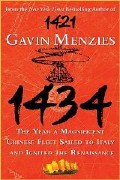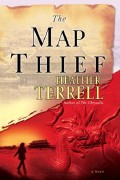The Return of Gavin Menzies
A reader wrote me in June:
I was just wondering if you have read the new book (due out this month, June 2008) called 1434 by Gavin Menzies in which he puts forward a hypthesis that the Chinese set off the Renaissance by giving their maps, astronomy, and all their knowledge to Europe in 1434, and that it is the Chinese maps that Piri Reis copied. NOTHING to do with extra terrestrials. Now historians are saying that Menzies is wrong, but they have NO better answer, other than extra terrestrials. I for one think, that the Chinese is a much more logical answer to the Piri Reis map than UFOS and extra terrestrials. Menzies also wrote another book a few years called 1421 in which he posited a theory that Zheng He travelled all over the world — including North and South America — thereby “discovering” it before Columbus. Menzies also says that Columbus did not discover America. He already knew it was there. It was on his maps. He just went to see for himself and to claim the land for Spain.
Do you have any comment?
Do I have any comment? Other than, oh goody, more unmitigated horseshit to refute? More assertions not backed up by stodgy old-fashioned stuff like, you know, evidence? More …
Hey, wait a minute. Space aliens? Who said anything about space aliens? Of all the loony arguments about what the Piri Reis map purportedly proves — polar shifting, an advanced ice-age civilization — space aliens is not one I’ve heard before, and I thought I’d been fairly thorough in my survey of bizarre Piri Reis theories.
My correspondent posits a false dichotomy: if it couldn’t have been space aliens, it had to be the Chinese.
Oh boy.
 That’s right: Gavin Menzies is back, and the silly season has started all over again. This time, as my correspondent pointed out, Zheng He is claimed to have sailed up the Aegean to provide — beneficiently — all of China’s knowledge to Europe, including the cartographic knowledge that allowed the Piri Reis map of 1513 and the European voyages of discovery. Plus the Renaissance. Plus unicorns. The Europeans, the Turks — they couldn’t have figured this out for themselves.
That’s right: Gavin Menzies is back, and the silly season has started all over again. This time, as my correspondent pointed out, Zheng He is claimed to have sailed up the Aegean to provide — beneficiently — all of China’s knowledge to Europe, including the cartographic knowledge that allowed the Piri Reis map of 1513 and the European voyages of discovery. Plus the Renaissance. Plus unicorns. The Europeans, the Turks — they couldn’t have figured this out for themselves.
In the Montreal Gazette, Tod Hoffman reviews 1434. Even though he considers Menzies’s previous work, 1421, which argues that the Chinese circumnavigated the world and discovered the Americas, “credible because it is based on a reasonable premise” — in other words, he doesn’t purport to be a full-throated skeptic — he doesn’t have kind words for 1434’s claims:
However, 1434 raises the question: Why on Earth would the Chinese emperor, who possessed exclusive access to the data necessary to traverse the globe (if we are to believe Menzies), voluntarily give precious information to the Europeans? He certainly didn’t need to show them the way to China in order to trade, because he knew the way to them. It just doesn’t make sense that the Chinese, always suspicious of foreigners and vigilant against invaders, would take the unnecessary risk of inviting Europeans to their doorstep.
There is something uncomfortably Wikipedia-like in the research methodology Menzies employs. Many of his contentions are sourced to “friends of the 1421 website” and he gives inordinate weight to the studies of very amateur scholars. It is all well and good to be receptive to ideas from wherever they may emanate, but never at the expense of intellectual rigour. For example, to support the assertion that the Chinese fleet sailed up the Adriatic coast en route to Italy, he cites a Croatian geneticist who reports longstanding local rumours of “Oblique-eyed yellow Easterners” visiting Adriatic islands sometime before 1522.
To say nothing of the fact that if a fleet of Chinese junks were to have turned up in the Adriatic, in a continent with an intellectual elite of writers, scholars, historians, bureaucrats and artists, somebody would have noticed. We would have heard about it by now; it’s incredulous to suppose that 574 years could have gone by without anyone making reference to an event of this magnitude, and then have it in sufficiently plain view that a bunch of amateurs could “discover” it.
Yeesh.
 Finally, via GeoCarta comes word that a novel has been published that uses Menzies’s theory as a plot element — i.e., that a Chinese map used by Europeans existed; the story has it going missing. Fine and good: this belongs in fiction, I say. It’s a mystery novel, it’s called The Map Thief, and it’s by Heather Terrell. But then I read this article about it from the Pittsburgh Tribune-Review and hope failed me:
Finally, via GeoCarta comes word that a novel has been published that uses Menzies’s theory as a plot element — i.e., that a Chinese map used by Europeans existed; the story has it going missing. Fine and good: this belongs in fiction, I say. It’s a mystery novel, it’s called The Map Thief, and it’s by Heather Terrell. But then I read this article about it from the Pittsburgh Tribune-Review and hope failed me:
The story — which posits the theory that Chinese sailors, under the guidance of Admiral Zhang He, traveled around the world — is based on historical fact. Terrell says there is indisputable evidence that Chinese fleets sailed throughout Asia and as far as the northern coast of Africa.
But there are also indications, based on Terrell’s research, that the Chinese may have traveled around the Cape of Good Hope and as far west as the Caribbean. The Chinese ruler, Emperor Yongle, was trying to establish China as a world power, and Terrell thinks the motivation to send the Chinese flights on long voyages fits in with the emperor’s world view.
If she’s saying what I think she’s saying, oh, crap. And I had such hopes. (The vast majority of science fiction writers don’t believe in UFOs, after all.)
Do I have any comment?
Do I?
Groan.
Previously: The Piri Reis Map of 1513. On Gavin Menzies, Liu Gang and purported maps showing Chinese discovery of the world in 1421, 1418 or 2200 BC or whatever: Author Claims Chinese Visited Americas and Made Maps in 2200 BC; Gavin Menzies in Australia; 1421 Exposed: Scholars Respond to Liu and Menzies; Experts Still Doubt Chinese Map’s Authenticity; Chinese Map Controversy: Liu Gang’s Press Conference; Chinese Map Media Briefing; A Look Back at the Chinese Map Controversy.
Update, Aug. 5: Jeff Baker writes that the Piri Reis-space aliens thing came from Erich von Däniken’s Chariots of the Gods, of which I was blissfully unaware.

Comments
blog comments powered by Disqus